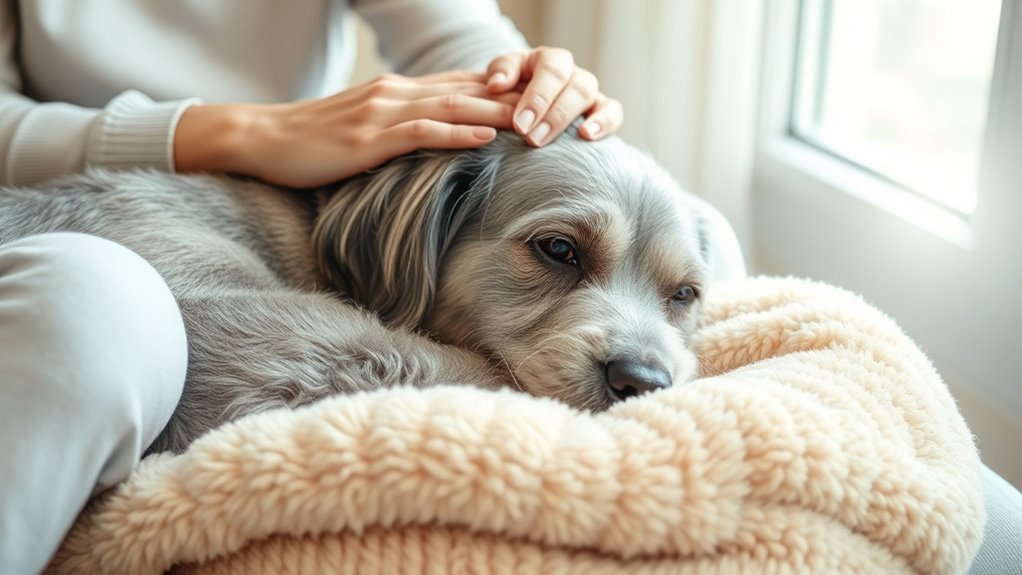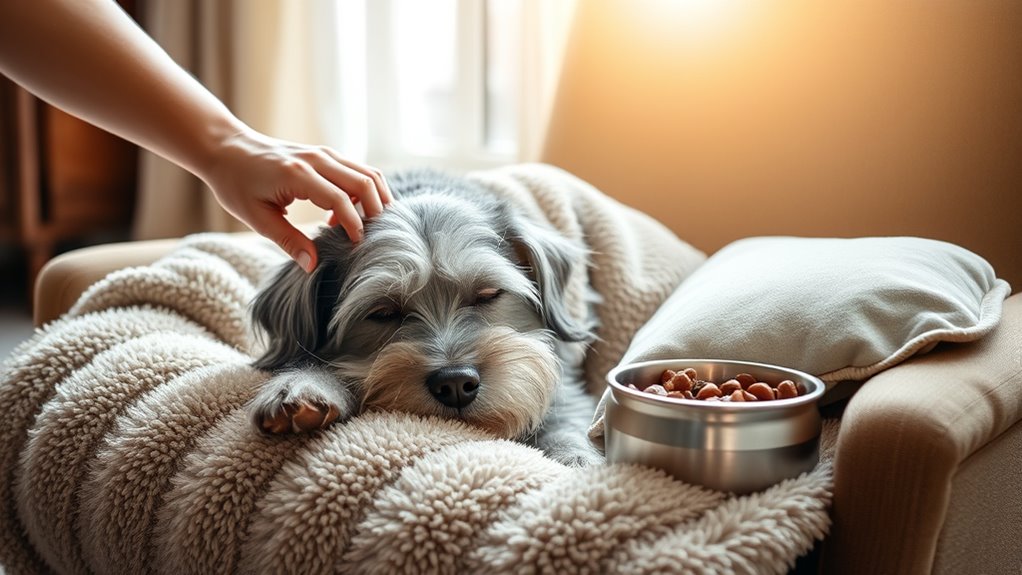To care for your senior pet’s health and comfort, adjust their diet with high-quality, age-appropriate food rich in omega-3s and antioxidants, and offer smaller, more frequent meals. Modify activity levels to gentle, low-impact exercises, and provide cozy, supportive resting spots. Regular vet visits and grooming keep health issues in check. Creating a calm, accessible environment enhances their well-being, and understanding sensory changes helps you meet their evolving needs—exploring these steps further can make a big difference.
Key Takeaways
- Provide a balanced, age-appropriate diet rich in omega-3s, antioxidants, and fiber, with smaller, frequent meals.
- Adjust activity routines with gentle exercises and short outings suited to their energy levels.
- Create a comfortable, accessible space with orthopedic beds and minimize environmental stressors.
- Schedule regular vet visits for early detection of health issues like dental, vision, or organ decline.
- Monitor sensory abilities and modify care to accommodate hearing or vision loss, ensuring a good quality of life.

As your pet ages, their needs change, making dedicated care essential for maintaining their health and happiness. One of the most important aspects of caring for a senior pet is paying close attention to their nutrition. As pets get older, their metabolism slows down, and they often become less active, which can lead to weight gain if their diet isn’t adjusted accordingly. To support their changing needs, you should focus on providing high-quality, age-appropriate food that’s rich in essential nutrients, such as omega-3 fatty acids, antioxidants, and fiber. These help maintain brain health, support joint function, and boost their immune system. It’s also wise to incorporate smaller, more frequent meals to aid digestion and prevent overeating. Always consult your veterinarian to determine the best diet plan tailored to your pet’s specific health conditions, whether they have dental issues, kidney concerns, or allergies. Additionally, understanding permanent vs. temporary hearing loss can be useful if your pet shows signs of sensory decline, ensuring you address their needs appropriately.
Alongside proper nutrition, making activity adjustments is crucial in ensuring your senior pet stays comfortable and active without risking injury. While regular exercise remains important, you should modify their activity levels to suit their current capabilities. Instead of vigorous play or long walks, opt for gentle, shorter outings that allow them to stretch and explore without overexertion. Soft, padded surfaces can help protect their joints, especially if they suffer from arthritis or other mobility issues. Incorporate low-impact activities like slow fetch, gentle tug-of-war, or even short, leisurely strolls around the yard. Keep an eye on their energy levels and watch for signs of fatigue or discomfort, adjusting activity accordingly. Remember, the goal isn’t to push your pet but to keep them engaged and mobile in a safe environment.
It’s also helpful to create a cozy, accessible space for your senior pet to rest, away from drafts or noisy areas. Regular, gentle grooming can prevent matting and skin issues while also giving you a chance to check for lumps, bumps, or other health concerns. Providing orthopedic beds or supportive mats can alleviate joint pain and improve sleep quality. Routine vet visits become even more crucial at this stage. They allow for early detection of age-related issues such as dental problems, vision or hearing loss, or organ function decline. With consistent attention to their nutrition, activity levels, and comfort, you’ll help your senior pet enjoy their golden years with dignity, vitality, and love.
Frequently Asked Questions
How Can I Detect Early Signs of Illness in My Senior Pet?
To detect early signs of illness in your senior pet, keep an eye on behavioral changes like decreased activity, appetite loss, or unusual vocalizations. Early symptom detection helps catch health issues sooner. Regularly monitor their bathroom habits, coat condition, and energy levels. If you notice anything unusual, consult your vet promptly. Staying attentive to these signs guarantees you can address health concerns early, keeping your pet comfortable and happy.
Are There Special Dietary Needs for Aging Pets?
Think of your senior pet’s diet as a finely tuned engine needing the right fuel. As they age, you should focus on special nutritional needs, adding nutritional supplements if recommended by your vet. Guarantee proper hydration strategies are in place to keep them energized. Adjust their diet to support joint health, weight management, and overall vitality, helping your furry friend stay comfortable and active through their golden years.
What Are Effective Ways to Reduce Senior Pet Anxiety?
You can reduce your senior pet’s anxiety with calming techniques like gentle massage, soothing music, or pheromone diffusers. Environmental enrichment also helps by providing new toys, comfortable resting spots, and regular gentle exercise. Keep a consistent routine to give your pet a sense of security. These strategies create a calming environment, helping your pet feel safe and relaxed as they age, easing their anxiety effectively.
How Often Should Senior Pets Be Re-Evaluated by a Vet?
You should schedule routine checkups for your senior pet at least twice a year, or more often if your vet advises. Regular wellness screenings help catch health issues early and keep your pet comfortable. Keep an eye on any changes in behavior or health, and don’t hesitate to book additional visits if needed. These checkups guarantee your pet’s ongoing health and provide peace of mind for you.
What Adaptations Can Improve My Senior Pet’S Daily Mobility?
Think of your senior pet’s mobility as a delicate dance that needs gentle guidance. You can enhance their daily routine with assistive devices like ramps or harnesses that serve as graceful stepping stones. Incorporate simple mobility exercises to keep their joints limber and muscles strong. These adaptations act as a comforting chorus, helping your pet move more freely and confidently through their golden years.
Conclusion
As your senior pet grows older, giving them extra love and attention becomes even more important. Regular vet visits, comfortable spaces, and gentle care can make their golden years truly special. Remember, isn’t it worth every effort to guarantee they feel loved and secure? Cherish each moment, knowing your kindness can make all the difference in their comfort and happiness. After all, they’ve been there for you—aren’t they deserving of your best care now?









